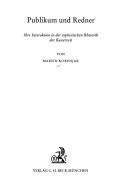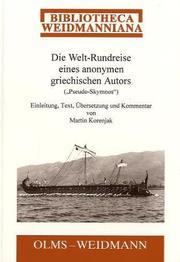| Listing 1 - 10 of 22 | << page >> |
Sort by
|
Book
ISBN: 3631302657 Year: 1996 Volume: 101 Publisher: Frankfurt am Main Lang
Abstract | Keywords | Export | Availability | Bookmark
 Loading...
Loading...Choose an application
- Reference Manager
- EndNote
- RefWorks (Direct export to RefWorks)
Pharsalus, Battle of, Farsala, Greece, 48 B.C., in literature --- Epic poetry, Latin --- Bataille de Pharsale, Pharsale, Grèce, 48 av. J.-C., dans la littérature --- Poésie épique latine --- History and criticism --- Histoire et critique --- Lucan, --- -Pharsalus, Battle of, Farsala, Greece, 48 B.C., in literature --- Pharsalus, Battle of, 48 B.C., in literature --- Latin epic poetry --- Latin poetry --- Rome --- History --- -Literature and the war. --- Pharsalus, Battle of, Farsala, Greece, 48 B.C., in literature. --- History and criticism. --- Literature and the war. --- Literature and the war --- Bataille de Pharsale, Pharsale, Grèce, 48 av. J.-C., dans la littérature --- Poésie épique latine

ISBN: 3406462170 9783406462177 Year: 2000 Volume: 104 Publisher: München Beck
Abstract | Keywords | Export | Availability | Bookmark
 Loading...
Loading...Choose an application
- Reference Manager
- EndNote
- RefWorks (Direct export to RefWorks)
Orators --- Rhetoric, Ancient --- Oratory, Ancient --- Orateurs --- Rhétorique ancienne --- Eloquence antique --- Speeches, addresses, etc., Latin --- History and criticism --- -Oratory, Ancient --- -Latin orations --- Latin speeches --- Classical languages --- Greek language --- Greek rhetoric --- Latin language --- Latin rhetoric --- Speakers --- Elocutionists --- Rhetoric --- Oratory, Ancient. --- Rhetoric, Ancient. --- History and criticism. --- -History and criticism --- -Classical languages --- Latin orations --- Rhétorique ancienne --- Ancient rhetoric --- Speeches, addresses, etc., Latin - History and criticism --- Orators - Rome
Book
ISBN: 9783406690327 3406690327 Year: 2016 Publisher: München Beck
Abstract | Keywords | Export | Availability | Bookmark
 Loading...
Loading...Choose an application
- Reference Manager
- EndNote
- RefWorks (Direct export to RefWorks)
Die neulateinische Literatur umfasst das Schrifttum vom Beginn der Renaissance bis zum heutigen Tag und stellt europaweit die bedeutendste Literatur der frühen Neuzeit dar. Die rasanten politischen und geistesgeschichtlichen Entwicklungen dieser Epoche von Lissabon bis Moskau und von Island bis Sizilien bilden sich in der neulateinischen Literatur nicht nur ab, sondern wurden durch sie massgeblich mitgeprägt. Dieses elegant geschriebene Buch bietet einen ebenso faszinierenden wie anschaulichen Überblick über die neulateinische Literatur und ihre Wirkmacht. Aus kaum einem Lebensbereich war sie wegzudenken - aus der Kirche so wenig wie aus der Landwirtschaft, aus der Diplomatie so wenig wie aus den Wissenschaften, aus der Kunst so wenig wie aus der Belletristik. Die Zahl bedeutender neulateinischer Autoren ist Legion - Petrarca, Nikolaus von Kues, Pius II., Celtis, Erasmus, Luther, Calvin, Bodin, Scaliger, Lipsius, Bruno, Bacon, Grotius, Descartes, Kircher, Balde, Leibniz, Newton und viele, viele mehr. Sie alle - aber auch Dichterinnen und Denkerinnen wie Olympia Fulvia Morata und Anna Maria von Schürmann - und ihre Beiträge zum europäischen Geistesleben in neulateinischer Sprache werden in diesem Band, dessen Lektüre keine Lateinkenntnisse erfordert, vorgestellt.--
Book
ISBN: 019263559X 0192635581 9780192635594 9780198866053 0198866054 Year: 2023 Publisher: Oxford Oxford University Press
Abstract | Keywords | Export | Availability | Bookmark
 Loading...
Loading...Choose an application
- Reference Manager
- EndNote
- RefWorks (Direct export to RefWorks)
During the early modern period, the emergence of what ultimately became modern science took place mainly in Latin, the international language of educated discourse of the era. Hundreds of thousands of scientific texts were published in Latin from the invention of print around 1450 to the demise of Latin as a language of science around 1850. Despite its importance, our knowledge of this literature is extremely limited.This book aims to provide an overview of this area, the first ever to be written. It does so, not from the perspective of a natural scientist or a historian of science, but of a literary scholar. Instead of the scientific content or methodology of the respective works, it focusses on the genres of scientific literature and their communicative functions.Latin Scientific Literature, 1450-1850 falls into two main parts. The first part ('Contexts') introduces four aspects of early modern intellectual culture which are crucial for an understanding of the scientific literature of the time: the development of science, the role of Latin, the concept of literature, and the rise of print. Part two ('Texts'), offers an overview of Neo-Latin scientific literature. Subsumed under five communicative functions - disclosing sources, presentingfacts, arguing for certain positions, summarizing knowledge, and publicizing science - twenty pertinent genres are discussed.
Latin literature, Medieval and modern --- Scientific literature --- History and criticism --- History
Book
ISBN: 9783150196106 3150196108 Year: 2019 Publisher: Ditzingen Reclam
Abstract | Keywords | Export | Availability | Bookmark
 Loading...
Loading...Choose an application
- Reference Manager
- EndNote
- RefWorks (Direct export to RefWorks)

ISBN: 3487118475 9783487118475 Year: 2003 Volume: 8 Publisher: Hildesheim Olms
Abstract | Keywords | Export | Availability | Bookmark
 Loading...
Loading...Choose an application
- Reference Manager
- EndNote
- RefWorks (Direct export to RefWorks)
Voyages around the world --- Voyages autour du monde --- Didactic poetry, Greek --- Geography, Ancient --- Didactic poetry, Greek. --- Ancient geography --- Geography --- Greek didactic poetry --- Greek poetry --- Didactic poetry, Greek - Translations into German --- Geography, Ancient - Poetry
Book
ISBN: 3703003626 Year: 2002 Publisher: Innsbrück Wagner
Abstract | Keywords | Export | Availability | Bookmark
 Loading...
Loading...Choose an application
- Reference Manager
- EndNote
- RefWorks (Direct export to RefWorks)
Epithalamia --- Laudatory poetry, Latin (Medieval and modern) --- Marriage in literature --- Marriages of royalty and nobility in literature --- Marriages of royalty and nobility --- Nobility in literature --- History and criticism --- History and criticism --- Ferdinand --- Ferdinand --- Leucht, Johannes, --- In literature.
Book
ISBN: 9783793098164 Year: 2016 Publisher: Freiburg im Breisgau Rombach
Abstract | Keywords | Export | Availability | Bookmark
 Loading...
Loading...Choose an application
- Reference Manager
- EndNote
- RefWorks (Direct export to RefWorks)
Book
ISBN: 9783968219394 3968219392 Year: 2023 Publisher: Baden-Baden Baden-Baden Rombach Wissenschaft Nomos
Abstract | Keywords | Export | Availability | Bookmark
 Loading...
Loading...Choose an application
- Reference Manager
- EndNote
- RefWorks (Direct export to RefWorks)
In der frühen Neuzeit griffen Autoren in großem Umfang auf antike Formen und Vorbilder zurück, um ihrer Leserschaft neue Erkenntnisse über die Natur nahezubringen. Die zwölf Beiträge des Sammelbandes thematisieren erstmals diesen aus heutiger Sicht überraschenden Befund. Sie nehmen eine breite Palette von Autoren und Textgattungen – von Hippokrates bis Leibniz und vom Aphorismus bis zum Lehrgedicht – in den Blick und fragen zugleich nach Konstanten in der Vielfalt der Formen und Inhalte. Der Band richtet sich an alle, die an der klassischen Antike, ihrer Rezeption, der Geschichte der Naturwissenschaften und der Geistesgeschichte der frühen Neuzeit interessiert sind. In the early modern period, authors drew extensively on ancient forms and models to introduce their readership to new insights into nature. The twelve contributions in this anthology are the first to address this finding, which is surprising from today’s perspective. They examine a wide range of authors and text genres—from Hippocrates to Leibniz and from aphorisms to didactic poems—and at the same time ask for constants in the diversity of forms and content. The volume is aimed at anyone interested in classical antiquity, its reception, the history of the natural sciences and the intellectual history of the early modern period.
Book
ISBN: 9783867571821 Year: 2007 Publisher: Rahden Leidorf
Abstract | Keywords | Export | Availability | Bookmark
 Loading...
Loading...Choose an application
- Reference Manager
- EndNote
- RefWorks (Direct export to RefWorks)
| Listing 1 - 10 of 22 | << page >> |
Sort by
|

 Search
Search Feedback
Feedback About UniCat
About UniCat  Help
Help News
News